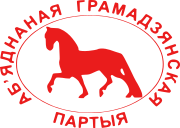United Civic Party Аб'яднаная грамадзянская партыя Объединённая гражданская партия | |
|---|---|
 | |
| Abbreviation | UCP (English) АГП (Belarusian) ОГП (Russian) |
| Leader | Mikalaj Kazloŭ |
| Founder | Stanislaŭ Bahdankievič |
| Founded | 1 October 1995 |
| Banned | 15 August 2023 |
| Merger of | United Democratic Party, Civic Party |
| Headquarters | 22th Building, Charužaj St, Minsk, Belarus |
| Youth wing | Young Democrats |
| Membership (2011) | 4,000 |
| Ideology | Liberal conservatism Economic liberalism Pro-Europeanism |
| Political position | Centre-right[1] |
| National affiliation | United Democratic Forces of Belarus |
| European affiliation | European People's Party (observer) |
| International affiliation | International Democrat Union |
| Colours | Red White |
| Slogan | «Construct a new, keep the best» (Belarusian: «Пабудуем новае, захаваем лепшае») |
| House of Representatives | 0 / 110
|
| Council of the Republic | 0 / 64
|
| Local seats | 0 / 18,110
|
| Website | |
| ucpb.info | |
The United Civic Party (UCP; Belarusian: Аб'яднаная грамадзянская партыя; АГП, romanized: Abjadnanaja hramadzianskaja partyja; AHP; Russian: Объединённая гражданская партия; ОГП, romanized: Obyedinonnaya grazhdanskaya partiya; OGP) is a banned liberal-conservative[1][2] and liberal[3][4] political party in Belarus. The party opposes the government of Alexander Lukashenko and has participated in the country's elections on a few occasions, but it did not have a single member in the Belarusian parliament until one member was elected during the 2016 elections. It claims that its lack of seats is due to the unfairness of the election process.
Famous party members are former Prime Minister Michaił Čyhir, the mysteriously disappeared politicians Jury Zacharanka and Viktar Hančar, and Hienadź Karpienka, who died prematurely.
- ^ a b Bugajski, Janusz (2002), Political Parties of Eastern Europe: A Guide to Politics in a Post-Communist Era, The Center for Strategic and International Studies, p. 22, ISBN 978-1-56324-676-0
- ^ Nordsieck, Wolfram (2019). "Belarus". Parties and Elections in Europe. Retrieved 2019-11-27.
- ^ Wilson, Andrew (2011-12-06). Belarus: The Last European Dictatorship. Yale University Press. p. 176. ISBN 978-0-300-13435-3.
- ^ Korosteleva, Elena A. (2005). "Party System Development in Belarus, 1988–2001: Myths and Realities". In Kulik, Anatoly; Pshizova, Susanna (eds.). Political Parties in Post-Soviet Space: Russia, Belarus, Ukraine, Moldova, and the Baltics. Praeger. p. 63. ISBN 0-275-97344-1.